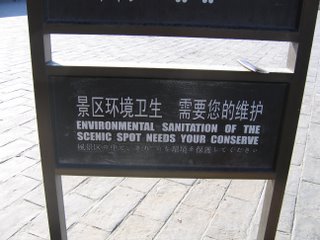Wednesday, November 22, 2006
holiday
From Sharon Astyk on self sufficent suburbia... "I have been talking a lot lately in various places about adaptation - the ways in which we can use our existing infrastructure to live a lower-impact life. And so, I wanted to describe how that might work. I chose as a model the suburban home of a college friend of mine, who coincidentally has become aware of peak oil and asked for my advice not long ago. She lives in an exurb of Boston, with no direct public transportation (there is a train line 15 minutes away), in a fairly conventional suburban home with her partner and two children, 1 1/2 and 5." more...
From Zane on floor boards and stillness ... "It is now already well into the evening as I write, and soon I will be ready to head up to the cozy loft, above my office here, and read for a while before bed. I have largely grown accustomed to these long days of work. I am starting to understand that this schedule is not a short-term thing, while we get set up, but it is the new rhythm of my life, and I like it. Projects for living, like building a house or growing a garden—these are satisfying jobs." more...
From Liz Deane on frugality... "I started reading about what is called "voluntary simplicity", "frugality", or "tightwadding", and devoured just about every book on the subject. I don't own any of them, having used the interlibrary loan system, but if I had one of those books lying around, I could probably open it up and find a list of things the average person can do to save money. Since I don't, I thought I'd make a list of things that we did to put more money in our bank account, where it belongs. These are all simple suggestions for anyone who is looking to cut back on the flow of money that makes it's way out the door each month." more...
From Douglas Barnes on Seed Balls... "Seed balls may be obscure in North America, but in parts of the world already badly damaged by human activity, their use is easily recognised. The BCIL Alt.Tech Foundation of India uses seed balls to regreen Bangalore. And as most of the planets deserts are the creation of mankind, we can follow their lead to undo the damage we have done." more...
Best wishes on this weekend of reflection and family.
Monday, November 20, 2006
very busy
Tuesday, November 14, 2006
subaru
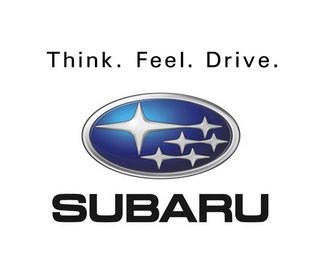 I'll be eating dinner this evening with Subaru executives and touring their new plant tomorrow about which they say,
I'll be eating dinner this evening with Subaru executives and touring their new plant tomorrow about which they say,"The average household sends more to a landfill than the entire Subaru manufacturing plant in Lafayette, Indiana. The Subaru plant is the first auto assembly plant to achieve zero landfill status - nothing from its manufacturing efforts goes into a landfill. It's all reused and recycled. The Subaru plant was determined to be the first auto assembly plant in the U.S. to be designated a Backyard Wildlife Habitat by the National Wildlife Federation in 2003. Deer, coyotes, beavers, blue herons, geese, rabbits, squirrels, meadowlarks, ducks and other animals live on the plant property in peaceful coexistence with the Subaru plant."
If you have any questions you'd like me to ask the folks at Subaru please leave them as comments. A full report to follow over at Groovy Green.
Thursday, November 09, 2006
one billion trees
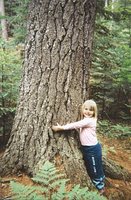 I'm a big fan of trees. In fact I like to make the argument that trees are much more intelligent than human beings; at least human beings in the United States of America born after the year 1950. Let me explain.
I'm a big fan of trees. In fact I like to make the argument that trees are much more intelligent than human beings; at least human beings in the United States of America born after the year 1950. Let me explain. Trees grow from tiny seeds into enormous creatures that can live for hundreds of years. Trees rely on their ability to obtain water and other necessary nutrients from their immediate environment. Talk about local, trees never move. They put down roots and absorb what they need from the surrounding soil. 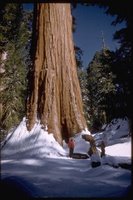 They also make leaves that absorb solar energy and transform it into food for the tree. Their leaves breathe in carbon dioxide and breathe out oxygen and water vapor, all in exchange from the surrounding air. And when the leaves have done their duty they are dropped to the ground where their nutrients are made available all over again. In other words trees meet all their needs, sometimes for a very, very long time, without ever moving from where they were born.
They also make leaves that absorb solar energy and transform it into food for the tree. Their leaves breathe in carbon dioxide and breathe out oxygen and water vapor, all in exchange from the surrounding air. And when the leaves have done their duty they are dropped to the ground where their nutrients are made available all over again. In other words trees meet all their needs, sometimes for a very, very long time, without ever moving from where they were born.
In contrast, Americans of the post WWII era have established a way of life that is incredibly dependant on constant movement. None of us could survive without constantly moving from one place to another to collect supplies and deposit waste. Our food is grown, on average, 1500 miles from where we eat it. The nutrients used to fertilize this food come from even farther away. We pump water from rivers and lakes through complex systems of pipe and wash away waste in a similar scheme. Surviving the elements is accomplished by using resources from all over the planet to build houses that require mechanical systems to maintain a comfortable temperature. And then there’s all the stuff we tell ourselves we need.
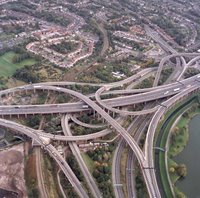 Constantly on the go, we have even developed a system by which we burn fossil fuels and therefore pollute our air in order to power vehicles to propel ourselves faster over impervious surfaces made of petroleum that need constant upkeep so we can get from one place to another in a great big hurry. Why? Because we can. Which sounds smarter to you, learning to live with what you have or always running around wanting more?
Constantly on the go, we have even developed a system by which we burn fossil fuels and therefore pollute our air in order to power vehicles to propel ourselves faster over impervious surfaces made of petroleum that need constant upkeep so we can get from one place to another in a great big hurry. Why? Because we can. Which sounds smarter to you, learning to live with what you have or always running around wanting more?
Philosophical queries aside this is why you (yes I mean you sitting right there at that your computer reading this) should plant trees. Trees clean our air. In addition to absorbing carbon dioxide, a
 You may not agree with me that trees are actually smarter than we are but it seems obvious that they are a wonderful part of life on this planet. So I have a challenge for you.
You may not agree with me that trees are actually smarter than we are but it seems obvious that they are a wonderful part of life on this planet. So I have a challenge for you.
Wangari Maathai, the woman who won the Nobel Peace Prize in 2004 is calling on us humans to plant 1 billion trees in 2007. “When we plants trees, we plant the seeds of peace and seeds of hope.” Please join the effort and help me and others plant trees. If you do, please send me a photo of the trees you plant. I will share your images. Thank you.
Trees For Life and Heifer International (trees make a wonderful Christmas gift)
Our City Forest
Trees For You
Other Study Summaries
Thursday, November 02, 2006
the great leaf wrangle of 2006
 It's now a family affair. Swing by my other haunt and check out the formal contest. Leaves, leaves everywhere. If you're curious, young Keaton is working to increase the surface area of each leaf therefore decreasing the time it takes for the pile to decompose. I didn't even have to suggest it. She just started crunching them all on her own. She's also tried directly absorbing their nutrients but we're teaching her it's much more tasty to break down the leaves and feed them to plants and then eat the plants. She's learning.
It's now a family affair. Swing by my other haunt and check out the formal contest. Leaves, leaves everywhere. If you're curious, young Keaton is working to increase the surface area of each leaf therefore decreasing the time it takes for the pile to decompose. I didn't even have to suggest it. She just started crunching them all on her own. She's also tried directly absorbing their nutrients but we're teaching her it's much more tasty to break down the leaves and feed them to plants and then eat the plants. She's learning. I must also mention how much help my brother has been in this year's leaf wrangle. Without his truck and his keen eye for compost feedstock we wouldn't be winning the contest 209 bags to 191 bags. Thank you Jon.
I must also mention how much help my brother has been in this year's leaf wrangle. Without his truck and his keen eye for compost feedstock we wouldn't be winning the contest 209 bags to 191 bags. Thank you Jon.
